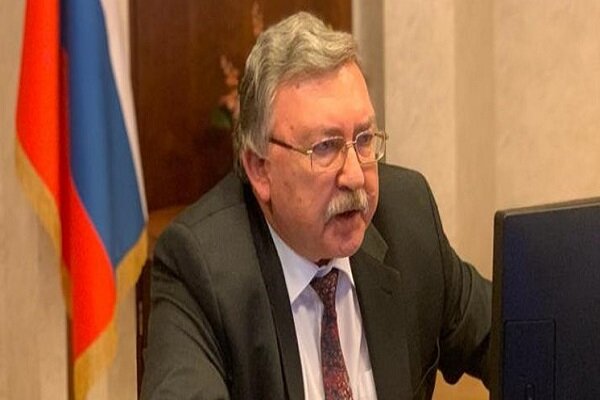We should not resume the Vienna talks on JCPOA from scratch: Russia

TEHRAN - Despite the hiatus that was brought about in the Vienna nuclear talks, the negotiations should not go back to day one, says the Russian ambassador to the International Atomic Energy Agency (IAEA).
“This is very important! We should not resume the Vienna talks on JCPOA from scratch,” Mikhail Ulyanov tweeted on Monday.
By the JCPOA, the Russian diplomat was referring to the Joint Comprehensive Plan of Action, the official name of the nuclear deal that was signed between Iran and the P5+1 group of countries -- the United States, the UK, France, Russia, China, and Germany -- in Vienna in July 2015.
The talks to revive the nuclear deal started in April and lasted until June 20. Six rounds of talks were held during this interval. The talks were suspended due to the presidential election in Iran in which a new government came to power. The talks to revitalize the deal were initiated as Joe Biden announced his administration is willing to return to the agreement.
“During the previous six rounds of negotiations significant and very useful progress has been achieved,” he added.
The new government in Iran is about to resume the nuclear deal talks in future days or weeks. However, new Iranian Foreign Minister Hossein Amir Abdollahian has been insisting that the talks should produce tangible results, which means a total and verified removal of sanction.
The April-to-June talks were held between Iran and the remaining parties to the agreement. The U.S. was participating in the talks indirectly. Iran had announced it would not enter direct talks with the American side until the U.S. rejoins the multilateral agreement and lift sanctions. The European Union as the coordinator of the talks acted as intermediary between Iran and the U.S.
Former U.S. president Donald Trump left the JCPOA in May 2018 and slapped the heaviest sanctions in history against Iran under his policy of “maximum pressure” campaign against the Islamic Republic. Trump was seeking a rewriting of the JCPOA. He wanted to deprive Iran, as a signatory to the nuclear Non-Proliferation Treaty (NPT), of its inalienable right to nuclear fuel cycle.
The Trump administration introduced total ban on Iran’s oil export, the country’s main source of income. Trump and his close team had the illusion that Iran would surrender to the maximum pressure policy. However, Iran adopted maximum resistance against the illegal sanctions.
Iran wanted to live up to its commitments to the JCPOA even without the United States. It remained fully loyal to the agreement for one year after the U.S. exit. However, in May 2019 the Supreme National Security Council of Iran announced that Tehran’s strategic patience is over and Iran started to gradually remove bans on its nuclear program. Even at the time the Islamic Republic announced that it will reverse its decisions if the European parties to the agreement compensate Iran for the sanctions. However, the European trio - Britain, France, and Germany - bowed to the American pressure and just paid lip service to the need to preserve the agreement.
Under the JCPOA Iran agreed to put limits on its nuclear activities in exchange for termination of economic and financial sanctions.
The nuclear deal was expected to be restored immediately after Biden came to power as he was acting as vice president when the deal was struck during Barack Obama’s presidency. However, the American team has been trying to link the revival of the agreement to Iran’s defensive missile program and refusal to lift new sanctions that Trump had imposed on Iran under different names.
Two senior political analysts have called on the Joe Biden administration to separate talks on a revival of the nuclear deal from security issues in West Asia.
Writing an article in the Foreign Policy, the two analysts said U.S. allies in West Asia have already taken the initiative on regional issues.
Insisting on a package deal could permanently derail nuclear talks, warned Professor Vali Nasr from Johns Hopkins University’s School of Advanced International Studies and Hossein Mousavian, a West Asia security and nuclear policy specialist at Princeton University.
Leave a Comment